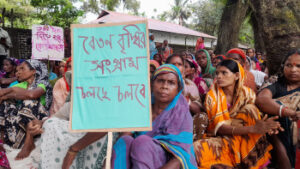
Officially, about 74 percent of tea workers live in poverty, according to a 2018 study by Bangladesh Bureau of Statistics. Even if you feel inclined to take a BBS statistic with a pinch of salt, it still is a huge number. Their precarity was made worse by the insanely high prices of daily essentials in the country. Thus, the proposed Tk-25 increase is not proportional to the rise in their expenses. It follows a historic pattern of exploitation in which workers are forced to serve their “masters” in exchange for a pittance. Although they are given some benefits in the form of housing, food rationing and primary healthcare, these facilities are not enough to complement their poor wages, nor does everyone have access to them. While talking to The Daily Star, workers described their miseries including uncertainty